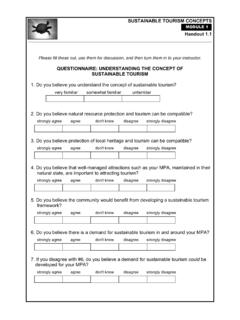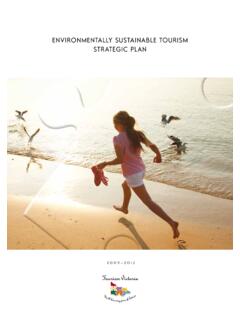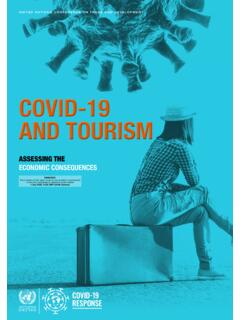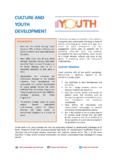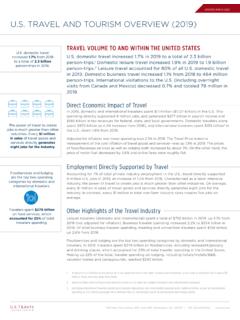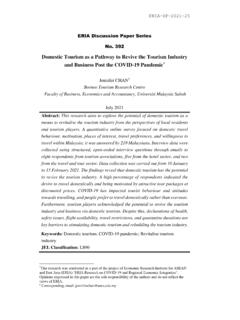Transcription of Código Ético Ingles 6 Tr - Amazon Web Services
1 Resolution adopted by the General Assembly21 December 2001A/RES/56/212 Global Code of Ethics for TourismThe General Assembly,Recalling its resolution 32/156 of 19 December 1977, by which it approved theAgreement on Cooperation and Relationships between the United Nations and theWorld tourism Organization,Reaffirmingparagraph 5 of its resolution 36/41 of 19 November 1981, in which it deci-ded that the World tourism Organization might participate, on a continuing basis, inthe work of the General Assembly in areas of concern to that organization,Recallingthe Manila Declaration on World tourism of 10 October 1980 adoptedunder the auspices of the World tourism Organization,1the Rio Declaration onEnvironment and Development2and Agenda 213adopted at the United NationsConference on Environment and Development on 14 June 1992, and taking note ofthe Amman Declaration on Peace through tourism adopted at the Global Summit onPeace through tourism on 11 November 2000 ,4 Consideringthat the Commission on Sustainable Development, at its seventh ses-sion, held in April 1999, expressed interest in a global code of ethics for tourismand invited the World tourism Organization to consider the participation ofinformed major groups in the development, implementation and monitoring ofits globlal code of ethics for tourism ,5 Recallingits resolution 53/200 of 15 December 1998 on the proclamation of 2002 asthe International Year of Ecotourism, in which, inter alia, it reaffirmed Economic andSocial Council resolution 1998/40 of 30 July 1998, recognizing the support of theWorld tourism Organization for the importance of ecotourism.
2 In particular the desig-nation of the year 2002 as the International Year of Ecotourism, in fostering betterunderstanding among peoples everywhere, in leading to greater awareness of therich heritage of various civilizations and in bringing about a better appreciation of theinherent values of different cultures, thereby contributing to the strengthening ofworld peace,Recognizingthe important dimension and role of tourism as a positive instrumenttowards the alleviation of poverty and the improvement of the quality of life for allpeople, its potential to make a contribution to economic and social development,especially of the developing countries, and its emergence as a vital force for the pro-motion of international understanding, peace and prosperity,1. Takes note with interest of the Global Code of Ethics for tourism adopted at thethirteenth session of the General Assembly of the World tourism Organization,6whichoutlines principles to guide tourism development and to serve as a frame of referen-ce for the different stakeholders in the tourism sector, with the objective of minimi-zing the negative impact of tourism on environment and on cultural heritage whilemaximizing the benefits of tourism in promoting sustainable development andpoverty alleviation as well as understanding among nations;2.
3 Emphasizes the need for the promotion of a responsible and sustainable tou-rism that could be beneficial to all sectors of society;3. Invites Governments and other stakeholders in the tourism sector to consider intro-ducing, as appropriate, the contents of the Global Code of Ethics for tourism in rele-vant laws, regulations and professional practices, and, in this regard, recognizes withappreciation the efforts made and measures already undertaken by some States;4. Encourages the World tourism Organization to promote effective follow-up to theGlobal Code of Ethics for tourism , with the involvement of relevant stake holders inthe tourism sector;5. Requests the Secretary-General to follow up developments related to the imple-mentation of the present resolution based on the reports of the World TourismOrganizaion and to report thereon to the General Assembly at its fifty-ninth , annex, appendix of the United Nations Conference on Environment and Development, Rio de Janeiro, 3-14 June 1992 (United Nations publications, Sales No.)
4 And corrigenda), vol. I: Resolutions adopted by the Conference, resolution 1, annex , annex A/55 Official Records of the Economic and Social Council, 1999, Supplement No. 9 (E/1999/29), decision 7/36 See E/2001/61, CODE OF ETHICSFOR tourism adopted by resolution A/RES/406(XIII) atthe thirteenth WTO General Assembly(Santiago, Chile, 27 September -1 October 1999).PREAMBLEWe, Members of the World TourismOrganization (WTO), representa-tives of the world tourism industry,delegates of States, territories,enterprises, institutions and bodiesthat are gathered for the GeneralAssembly at Santiago, Chile on thisfirst day of October 1999,Reassertingthe aims set out in Article3 of the Statutes of the World TourismOrganization, and aware of the deci-sive and central role of thisOrganization, as recognized by theGeneral Assembly of the UnitedNations, in promoting and developingtourism with a view to contributing toeconomic development, internationalunderstanding, peace, prosperity anduniversal respect for, and observanceof, human rights and fundamentalfreedoms for all without distinction asto race, sex, language or religion,Firmly believingthat, through thedirect.
5 Spontaneous and non-media-tized contacts it engenders betweenmen and women of different culturesand lifestyles, tourism represents avital force for peace and a factor offriendship and understanding amongthe peoples of the world,In keepingwith the rationale of rec-onciling environmental protection,economic development and the fightagainst poverty in a sustainable man-ner, as formulated by the UnitedNations in 1992 at the Earth Summit of Rio de Janeiro and expressed inAgenda 21, adopted on that occasion,Taking into accountthe swift and con-tinued growth, both past and foresee-able, of the tourism activity, whetherfor leisure, business, culture, religiousor health purposes, and its powerfuleffects, both positive and negative, onthe environment, the economy andthe society of both generating andreceiving countries, on local communi-ties and indigenous peoples, as well ason international relations and trade,Aimingto promote responsible, sus-tainable and universally accessibletourism in the framework of theright of all persons to use their freetime for leisure pursuits or travelwith respect for the choices of soci-ety of all peoples,But convincedthat the worldtourism industry as a whole hasmuch to gain by operating in anenvironment that favours the mar-ket economy, private enterpriseand free trade and that serves tooptimize its beneficial effects onthe creation of wealth and employ-ment,Also firmly convincedthat, provideda number of principles and a cer-tain number of rules are observed.
6 Responsible and sustainable tourismis by no means incompatible withthe growing liberalization of theconditions governing trade in ser -vices and under whose aegis theenterprises of this sector operateand that it is possible to reconcilein this sector economy and ecology,environment and development,openness to international tradeand protection of social and culturalidentities, Consideringthat, with such anapproach, all the stakeholders intourism development national,regional and local administrations,enterprises, business associations,workers in the sector, non-govern-mental organizations and bodiesof all kinds belonging to thetourism industry, as well as hostcommunities, the media and thetourists themselves, have differentalbeit interdependent responsibili-ties in the individual and societaldevelopment of tourism and thatthe formulation of their individualrights and duties will contribute tomeeting this aim,Committed, in keeping with theaims pursued by the WorldTourism Organization itself sinceadopting resolution 364(XII) at itsGeneral Assembly of 1997(Istanbul)
7 , to promote a genuinepartnership bet ween the publicand private stakeholders intourism development, and wishingto see a partnership and coopera-tion of the same kind extend, inan open and balanced way, to therelations between generating andreceiving countries and theirrespective tourism industries,Following up onthe ManilaDeclarations of 1980 on WorldTourism and of 1997 on the SocialImpact of tourism , as well as on theTourism Bill of Rights and theTourist Code adopted at Sofia in1985 under the aegis of WTO, But believingthat these instru-ments should be complemented bya set of interdependent principlesfor their interpretation and appli-cation on which the stakeholders intourism development shouldmodel their conduct at the dawn ofthe twenty-first century,Using, for the purposes of thisinstrument, the definitions andclassifications applicable to travel,and especially the concepts of vis-itor , tourist and tourism , asadopted by the Ottawa Inter -national Conference, held from 24to 28 June 1991 and approved, in1993, by the United NationsStatistical Commission at its twenty-seventh session,Referringin particular to the fol-lowing instruments:affirm the right to tourism and thefreedom of tourist movements, state our wish to promote an equi-table, responsible and sustainableworld tourism order, whose benefitswill be shared by all sectors of soci-ety in the context of an open andliberalized international economy,andsolemnly adopt to these ends theprinciples of the Global Code ofEthics for tourism .
8 Universal Declaration of HumanRights of 10 December 1948; International Covenant on Economic,Social and Cultural Rights of 16 December 1966; International Covenant on Civil andPolitical Rights of 16 December 1966; Warsaw Convention on Air Transportof 12 October 1929; Chicago Convention on InternationalCivil Aviation of 7 December 1944,and the Tokyo, The Hague andMontreal Conventions in relationthereto; Convention on Customs Facilities forTourism of 4 July 1954 and relatedProtocol; Convention concerning the Pro -tection of the World Cultural andNatural Heritage of 23 November1972; Manila Declaration on World Tourismof 10 October 1980; Resolution of the Sixth GeneralAssembly of WTO (Sofia) adopting theTourism Bill of Rights and Tourist Codeof 26 September 1985; Convention on the Rights of the Childof 20 November 1989; Resolution of the Ninth GeneralAssembly of WTO (Buenos Aires) con-cerning in particular travel facilitationand the safety and security of touristsof 4 October 1991; Rio Declaration on the Environmentand Development of 13 June 1992; General Agreement on Trade inServices of 15 April 1994; Convention on Biodiversity of 6 January 1995; Resolution of the Eleventh GeneralAssembly of WTO (Cairo) on the pre-vention of organized sex tourism of22 October 1995; Stockholm Declaration of 28 August1996 against the Commercial SexualExploitation of Children; Manila Declaration on the SocialImpact of tourism of 22 May 1997.
9 Conventions and recommendationsadopted by the International LabourOrganization in the area of collectiveconventions, prohibition of forcedlabour and child labour, defence ofthe rights of indigenous peoples, andequal treatment and non-discrimina-tion in the work place; Interiores Codigo E?tico Ingle?s 09:2 Interior Ingles 26/11/09 16:48 P gina 1 Resolution adopted by the General Assembly21 December 2001A/RES/56/212 Global Code of Ethics for TourismThe General Assembly,Recalling its resolution 32/156 of 19 December 1977, by which it approved theAgreement on Cooperation and Relationships between the United Nations and theWorld tourism Organization,Reaffirmingparagraph 5 of its resolution 36/41 of 19 November 1981, in which it deci-ded that the World tourism Organization might participate, on a continuing basis, inthe work of the General Assembly in areas of concern to that organization,Recallingthe Manila Declaration on World tourism of 10 October 1980 adoptedunder the auspices of the World tourism Organization,1the Rio Declaration onEnvironment and Development2and Agenda 213adopted at the United NationsConference on Environment and Development on 14 June 1992.
10 And taking note ofthe Amman Declaration on Peace through tourism adopted at the Global Summit onPeace through tourism on 11 November 2000 ,4 Consideringthat the Commission on Sustainable Development, at its seventh ses-sion, held in April 1999, expressed interest in a global code of ethics for tourismand invited the World tourism Organization to consider the participation ofinformed major groups in the development, implementation and monitoring ofits globlal code of ethics for tourism ,5 Recallingits resolution 53/200 of 15 December 1998 on the proclamation of 2002 asth




